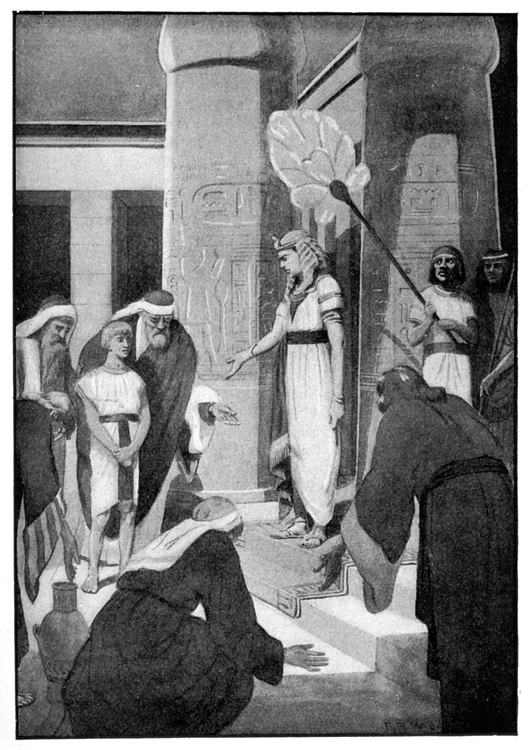Category Archives: Scripture
More Prophetic Pictures in the Story of Judah, Joseph and Benjamin
Genesis 44:32–34, Became surety for the lad. Christian commentator Matthew Henry on this passage states, “Judah’s faithful cleaving to Benjamin, now, in his distress, was recompensed long afterwards by the tribe of Benjamin keeping with the tribe of Judah, when the other tribes deserted it” (Matthew Henry Concise Commentary on the Whole Bible, p. 56).
It is amazing that some 800 years later this fraternal love between the two tribes of Judah and Benjamin continued to work in the collective psyches of these tribes such that the heart of the younger was still knit in loyalty with that of older brother. What does this say about generational blessings (and curses) or attitudes that are passed on down to one’s descendants? If curses can be passed on down to the third or fourth generation (Exod 20:5), how about blessings? The Book of Proverbs states that, “Death and life are in the power of the tongue, and those who love it will eat its fruit,” (Prov 18:21) and that, “ A wholesome tongue is a tree of life, but perverseness in it breaks the spirit,” (Prov 15:4).
Generations of our descendants can be affected positively or negatively by the inclination of our hearts and the words of our mouth. It had been Judah’s idea to sell Joseph to slave traders. In the meantime, Judah’s heart had changed so that he was willing to lay down his life for his brother, Benjamin, Joseph’s only full brother. This change of heart on Judah’s part and the resulting outpouring of love for his youngest brother had lasting positive results. What are the prophetic implications of this relationship between Joseph (Ephraim and Manasseh) and Judah?
Did Judah recognize Joseph, or did Joseph have to reveal himself? (Read Gen 45:1–4.) Was Judah “blinded” to whom Joseph was? Why? What is this a prophetic picture of? (See Rom 11:25.) As we have seen in the previous studies, Joseph was a type of the Messiah as well as the father of Ephraim and Manasseh, the dominate tribes of the Northern Kingdom of Israel, who went apostate and become “lost sheep” among the nations of the world (Hos 7:8; 8:8; Ezek 34:16 and numerous other Scriptures). Therefore, who does Joseph prophetically represent? This is a prophetic picture of the “lost sheep of the house of Israel” and the Messiah who would come to seek out those lost sheep (Matt 15:24; 10:6). And whom does Judah represent? Is Judah a prophetic shadow of the Lion of the Tribe of Judah who would later come as the Messiah to redeem his “brother” who would be lost in spiritual Egypt? Or does he represent the Southern Kingdom of the house of Judah who is “blind” to his Messiah? Perhaps he is a prophetic picture of both. These are potentially difficult questions to answer. One could easily force these scriptures in Genesis to fit into a false prophetic scenario.
This has been a head scratcher for the Jewish sages as well. They have seen in the story of Joseph, the Suffering Servant, a Messiah Son of Joseph figure who they felt would be a descendant of Ephraim and who would come to redeem the lost sheep or exiles of the house of Israel in preparation for a second Messiah to come whom they refer to as the Conquering King or Messiah the Son of David, (Mesorah Publications ArtScroll Bereishis, vol. 1(b), pp. 2121–2122). They see these Messiahs as two separate individuals. Yet in our story of Joseph and Judah can we see the antetypes of these two Messiahs acting out their roles at the same time? Could Judah and Joseph point to both comings of Messiah Yeshua? At his first coming, did not Yeshua, the Suffering Servant, come to redeem a remnant of lost Judah in addition to a much larger portion of “the lost sheep of the house of Israel”? Yet at his second coming, will this same Messiah Son of Joseph come back as the Lion of Judah to be revealed to his Jewish brothers who had previously rejected him?
Are you spiritual naked and unprepared for Yeshua’s coming?
Mark 14:51, A certain young man…naked. The reason for the inclusion of this detail in the Gospel record has puzzled many commentators. For example, Matthew Henry suggests that it was added to show the barbarous nature of the Jewish gang that arrested Yeshua, and how narrow was the disciples’ escape from their hands.
There seems, however, to be a greater spiritual lesson to be learned from this story.
Previous to this, Yeshua, as he and his disciples were coming into the Garden of Gethsemane, admonished them to sit and pray with him (v. 32), to stay and watch (v. 34), to watch and pray so as not to fall into temptation because of the weakness of the flesh (v. 38). Instead, the disciples slept (vv. 37, 40). Elsewhere, Yeshua instructs the elect saints of the last days to endure tribulation and spiritual apostasy to the end (Matt 24:13), and to watch vigilantly and be ready for his second coming (Matt 24:42, 44; 25:13). These warnings are in the context of his Parable of the Ten Virgins. All slept while awaiting the bridegroom’s arrival. While five were spiritually prepared, five were not. Those who were unprepared were dubbed as foolish and weren’t allowed into the wedding. Likewise, in the end times, there will be believers who YHVH views as wretched, miserable, poor, blind, and naked because they have grown lukewarm spiritually (Rev 3:14–17).
The point of this discussion is this: If the disciples of Yeshua fail to maintain a state of spiritual preparedness (by watching, praying, keeping oil in their spiritual lamps, enduring to the end) while awaiting his return, they, like the young man in Gethsemane and the Laodiceans in the Book of Revelation, will be found to be spiritually naked lacking robes of righteousness on the day of his return and thus unprepared to meet him (Rev 19:7–9 cp. Matt 22:2, 11–12).
The Story of Joseph Is a Prophetic Antitype of End Time Events
Joseph and Judah (the Two Houses of Israel)
In what follows, we will see types and shadows that point to the end-time reunification of the two houses of Israel (Joseph/Ephraim and Judah/the Jews), and to Yeshua the Messiah whose role it would be to regather and reunite the two houses of Israel by laying his life down as a ransom or substitute for his brothers. In this study, we will discuss the following themes:
- reuniting lost family members
- reconciliation and healing of wounds and offenses between families
- forgiveness of past wrongs, offenses and misunderstandings
- prophetic shadows of Yeshua the Messiah
Let’s now analyze the events in the life of Joseph (and to a lesser degree, Judah) as they occurred chronologically to see how they pointed forward to events that would occur in the future including the end times.
Joseph Taken as Captive to a Gentile Nation (Gen 37)
Joseph was sold into slavery and taken as a captive to Egypt. Similarly and prophetically, Joseph’s descendants (Ephraim and Manasseh), along with their fellow tribesmen of the northern kingdom of Israel (or house of Israel), were taken as captives into Assyria (ca. 723 B.C.). From there they were scattered around the world (into spiritual “Egypt,” ) where the biblical prophets predicted they would remain until the final regathering at the end of the age (just prior to and at the coming of Messiah). We will understand this more as we proceed.
Joseph: From Slave to Ruler (Gen 37, 41)
At first, Joseph was a slave and a prisoner in Egypt, but then he prospered and was elevated to a position of leadership there. Likewise, in the future, Joseph’s descendants (Ephraim, Manasseh, and the rest of the house of Israel) would start out as slaves and captives in Assyria (in the eighth century b.c.), but would later become leaders and rulers Continue reading
Are you close, but not there yet?
Mark 12:34, You are not far from the kingdom. Yeshua makes this complimentary statement to the scribe who had correctly and succinctly summarized the message of the Torah (both its letter and spirit intent) in verses 32–33.
However, note that Yeshua didn’t say, “You are in the kingdom of Elohim (i.e. you have eternal life).”
What was the one thing that kept the scribe from being in the kingdom?
It was doubtless the same thing that kept the rich young ruler from obtaining the eternal life that he sought (Matt 19:16). After having obeyed the Torah the best he could, the young ruler still needed to surrender all to Yeshua the Messiah, and to follow him unreservedly (Matt 19:18–22).
Not only is it difficult for humans to surrender all to the Master, and then to follow him wherever he leads, but having followed the Torah the best we can, we must still humbly recognize that without the righteousness of Yeshua in the equation, our best efforts at Torah-obedience will still miss the mark of YHVH Elohim’s acceptable standard of righteousness, thus leaving us maybe not far from the kingdom, but definitely not in the kingdom of Elohim.
Genesis 42–46 Two Brothers and the Two Houses of Israel in End-Time Prophecy
Biblical Types and Antetypes
A major key to understanding biblical prophecy is to recognize the relationship between antetypes and types in the Scriptures. This means that an event or a series of events occurred once, was recorded in the Scriptures, and then at a later time a similitude of the event repeats itself, but with different characters and scene.
An antetype is a type or pattern of something that occurs before the actual event occurs (sometimes incorrectly referred to as an antitype, which means opposite rather than before). In other words, the first event predicts or points prophetically to the future event. This is a way for the Creator to give clues and hints about future events that will come to pass. Those who are ardent students of his Word and those “who have (spiritual) ears to hear” will pick up on these clues and be able to have a sense of what the Creator is going to do at some future date. In this way, those who diligently seek him are rewarded with understanding or “inside information” about what he is planning to do in the future. At the same time, his divine plans and purposes will be obscured from those who don’t have a diligent heart to seek him and his truth, and who could possibly misuse the truth, if they were to discover it, for selfish purposes if they were to learn it.
Similarly, the Gospels record that Yeshua explained deep spiritual truths via parables not to make the meaning clear to the general public, but rather to obscure it. His teachings were Continue reading
Gen 41–44:17 Parashat Miketz pt 1
This is a gospel-oriented Torah study. Our goal is to connect the good news of Yeshua the Messiah (the gospel message) to its Hebraic, pro-Torah roots or foundations. The information given here is more than head knowledge. Understanding and wisdom (the right application of knowledge that is based on truth) is taught thus making biblical truth practical, relevant and applicable to your daily life. The truths of the Bible not only have the power to transform your life here and now for the better, but eventually to take you past the veil of death and into eternity.
This Torah study is subdivided in sections by topic in a magazine format thus making it easy to watch at several sittings.
May you be blessed as you watch this video.
For a free, printable adult and youth Torah study guide on this Torah portion (parashah), please go to http://www.hoshanarabbah.org/parshiot.html



